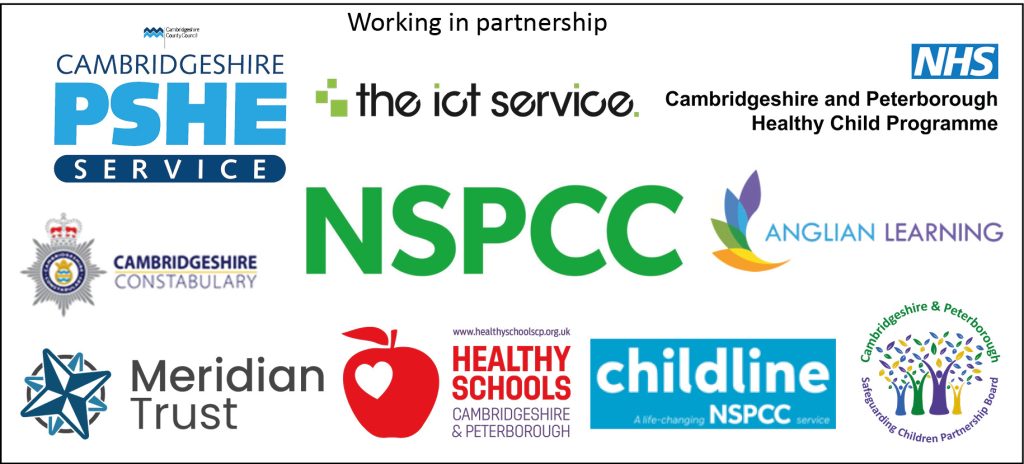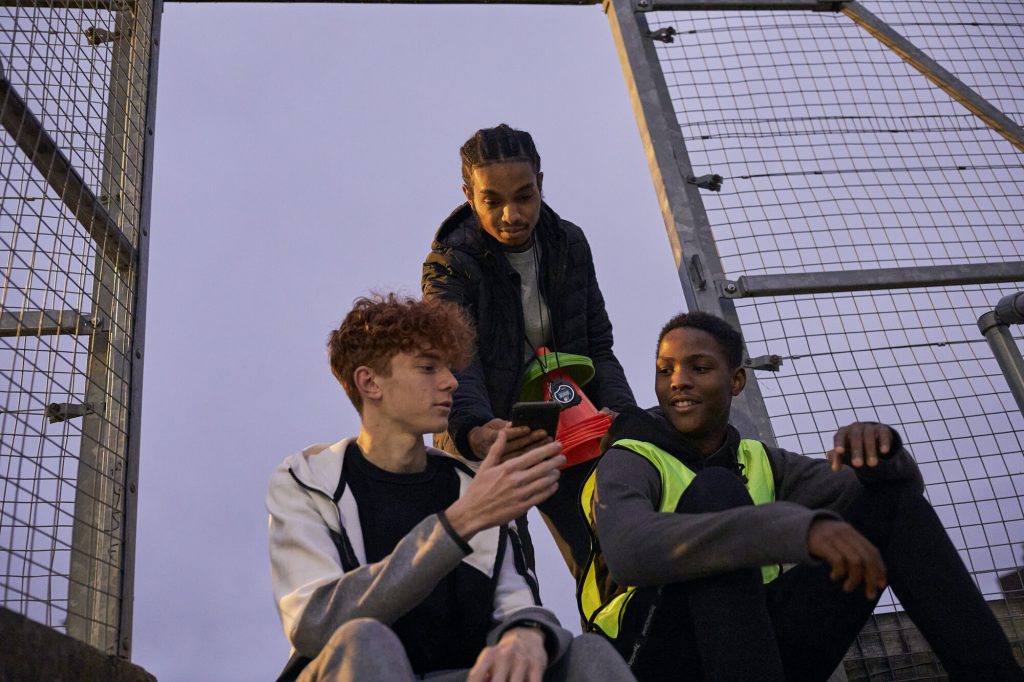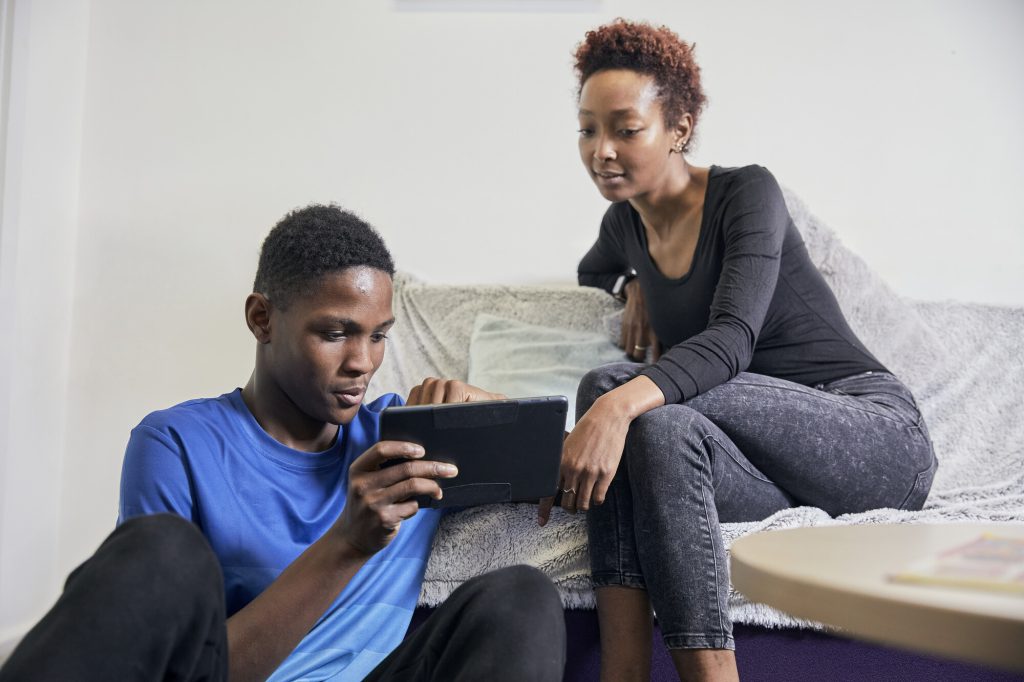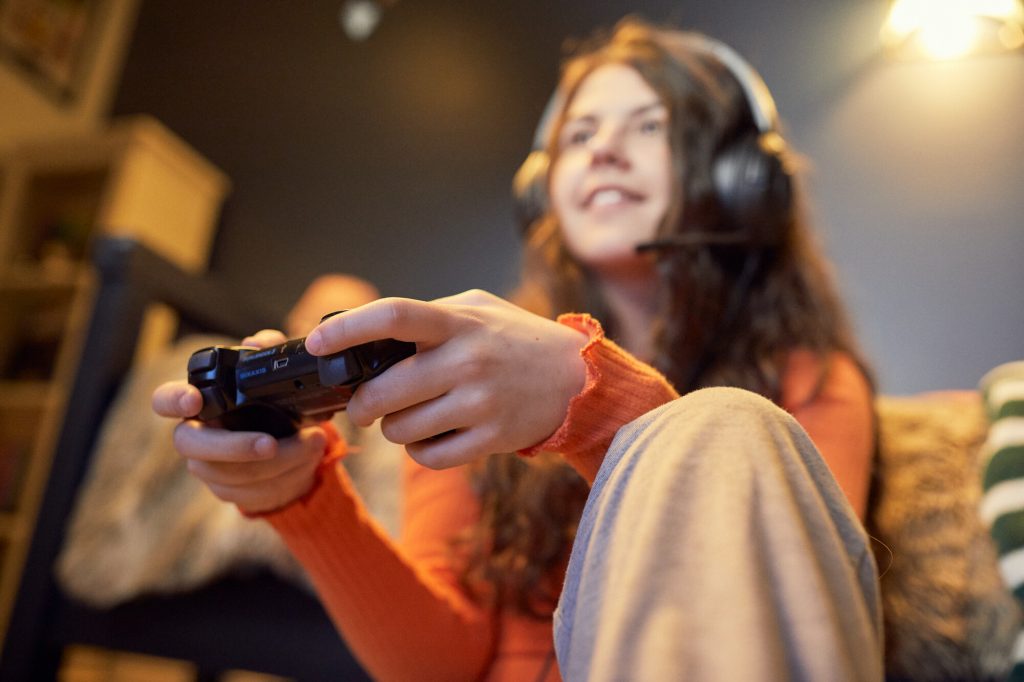
The NSPCC is working in conjunction with local partner organisations to help support parents and carers as well as professionals to feel confident in talking about online safety with the children and young people they know and work with.
The internet is a great place for children to learn, create, chat with friends and family, access information or support and explore fun apps, sites and games. But exploring comes with risks, so it’s vital everyone knows how to help keep them safe online. A series of online safety sessions targeted specifically at parents and carers can be booked here: https://www.online-safety-sessions-for-parents-and-carers

The sessions which are taking place between November ’24 – February ’25 will cover topics such as cyberbullying, social media, sharing images and gaming.
The NSPCC also delivers face to face as well as virtual workshops and can be organised for community groups, schools as well as business networks. To organise one of these, please email: Ellen.Smith@NSPCC.org.uk

Key Risks To Children and Young People; It’s important to know
• Who they’re talking to
– This includes grooming and cyberbullying
• What they’re seeing
– Innocent searches can lead to not so innocent results
– Children are often a few clicks away from inappropriate/harmful content
• What they’re ‘oversharing’
– Personal information, location and nude images/videos
– Remember that when young people share online, it may never be fully private
Signs of Online Abuse; What to look out for
• Children may not know what’s happening to them, so the signs may not always be obvious
• Sudden, unexplained changes are usually an indication that something’s wrong
• Consider what’s age-appropriate for your child
Top tips for supporting children and young people to manage their online behaviour

Start a conversation
An open and honest conversation is often the first step in keeping your child safe online, it also plays an important role in supporting them if something has gone wrong.
Talk to your child about what has happened, how they feel about it, and what the next steps are for you to take as a family.
Keeping your child in the loop about what you are going to do to resolve the situation can help them to feel in control of it and can help them to feel like they can come to you with any future problems.
Be curious, not furious
Remaining calm and asking questions like ‘how did you get to that?’ or ‘what did you click on?’ will help you to understand how the content has appeared in the first place.
Children will often remember the immediate response from an adult – remaining calm and open will show them that you are someone they can turn to for help.
Try not to place blame
It may be that your child has clicked on something by mistake or even gone looking for the content on purpose, either way, it is still important to remain calm and be supportive.
Children are curious and may hear about things from others that they later search for without realising what they will be exposed to.

Practical tips for starting a conversation about life online
As a parent or carer, one of the most important things you can do to help keep your children safe online is talk to them. It can be difficult to know how to start these conversations, so we’ve come up with some top tips.
Be positive and open minded about the internet
It’s important to recognise the exciting opportunities that going online can offer children and young people.
Although your children may use the internet differently to you, their experiences are still significant.
If your child mentions something you haven’t heard of, ask them to show you, or explain in more detail, or you may need to do your own research.
Try to keep conversations broad, and value their opinions when they’re talking about what they enjoy doing, to show that you are interested in all aspects of their online world.
Talk early and often
The most effective way to deal with any online issue is to make conversations about the internet a part of your everyday routine.
Talking openly about life online from an early age, can be a helpful bridge to sharing safety messages and addressing more difficult conversations later; it also shows your child that you are someone who knows about the internet and can help them. Create a safe space for conversations
Look for opportunities to talk together. Sometimes, talking face-to-face can feel difficult, so talking alongside each other when out for a walk, or travelling in the car for example, are options that might make it easier.
The environment needs to be right; free from distractions, so that your child has your undivided attention. Remind them often that they can talk to you about anything, no matter how difficult, and that they will not be judged or blamed.
Your child might not be ready to talk about something straight away, so show them that you are there to listen whenever they are ready.
Keep it relevant
As they get older, your children will use technology differently from when they first went online. Their knowledge and understanding will grow too, as will the challenges they may face on the internet.
To get a sense of how much they know and what support they still need, ask open-ended questions to let your child lead the conversations you have.
There are appropriate ways to approach all online safety topics with different ages. For example, with a teenager, nude images can be spoken about in wider conversations around consent and healthy relationships.
For younger children, you could discuss what types of images are okay to share online, and what areas of our bodies are private.
Be proactive
Working together to create an agreement, outlining how the internet and technology will be used within the family, is a useful way to set clear expectations and boundaries for your children.
You might include time spent online; who your children can communicate with; appropriate apps and games; and why safety tools are helpful to block and report inappropriate content.
Ask your child what they would do if something went wrong online and they needed help and reinforce the importance of telling an adult as soon as anything happens that makes them feel upset, worried, or uncomfortable in any way.
How to talk about difficult topics
- Plan what you want to say in advance and seek support and information if needed so that you feel prepared.
- Choose a moment when there are no other distractions, and you are not rushed for time but acknowledge that they might not feel ready to speak straight away.
- Consider the best approach to anticipate how your child might react. You might want to directly explain the concerns that led to the conversation or feel that asking some broader questions might be more suitable in the first instance.
- Give your child time to process what you are saying and share their thoughts, without interruption or blame. Listen carefully to any confusion or concerns.
- Share your own experiences if you can. Were you ever in a similar situation and how was it resolved?
- Reassure them you are always there to help and even if you don’t know the answers, you can find these out together.
- Get support quickly if they need it. This might be from family, friends, your child’s school or other agencies.
My child has said something worrying – what do I do?
- Remain composed. If you are feeling shocked, angry, or worried, it’s likely that your child is feeling worse, but reacting that way may close down the conversation and lead your child to believe that they are to blame.
- Acknowledge the challenges they have overcome and let them know that they’ve done the right thing by telling you.
- Be honest. It’s okay if you are unsure what to do next, the important thing is to let your child know you are there for them. There is a lot of further support out there to help you decide on your next steps.
- Save the evidence wherever possible. You may be able to report what has happened to the online service being used when the incident occurred. Evidence may include screen shots taken on a laptop or mobile device, emails, texts, or online conversation histories.
- Make a report as soon as possible. Knowing who to report to is a useful step to resolving many issues, so try to familiarise yourself with the reporting, blocking or moderating settings available on the services your child is using. Depending on what has happened, it might be necessary to let your child’s school know too, or other agencies such as the police.
Signposting; Where to find help
You can find more tips at https://www.nspcc.org.uk/keeping-children-safe/online-safety/.
For more information and advice, contact the NSPCC’s trained helpline practitioners, you can call the NSPCC Helpline on 0808 800 5000.
Support for children and young people is available through Childline on 0800 1111 or at www.Childline.org.uk
Access the Childline website for advice and information, share experiences and get peer support on the Childline message boards: www.childline.org.uk/get-support/message-boards
Visit Childline’s online and mobile safety page to learn how to stay safe online: www.childline.org.uk/info-advice/bullying-abuse-safety/online-mobile-safety
Watch films on lots of different topics on Childline’s YouTube Channel (aimed at young people aged 13-18): www.youtube.com/user/childline
Contact Young Minds crisis messenger (Text YM to 85258) or visit the Young Minds website for advice about mental health: www.youngminds.org.uk
Cambs Community Services https://www.cambscommunityservices.nhs.uk/
Cambridgshire and Peterborough Healthy Child Programme Who we are and what we do (cambscommunityservices.nhs.uk)
Chat Health Vimeo – ChatHealth on Vimeo
ChatHealth Cambridgeshire and Peterborough ChatHealth (cambscommunityservices.nhs.uk)
Explore the resources provided by the Safeguarding Board Partnership www.safeguardingcambspeterborough.org.uk/children-board/professionals/exploitation/
Raising a concern; How to report a site
- Contact CEOP if you’re concerned about someone making inappropriate or sexual contact with a child online: www.ceop.police.uk/safety-centre
- Report sexual images and videos of children shared online to the Internet Watch Foundation https://www.iwf.org.uk/
- Report anything online which causes someone distress or harm to Report Harmful Content: www.reportharmfulcontent.com
If you believe a child is at immediate risk of harm then call 999


